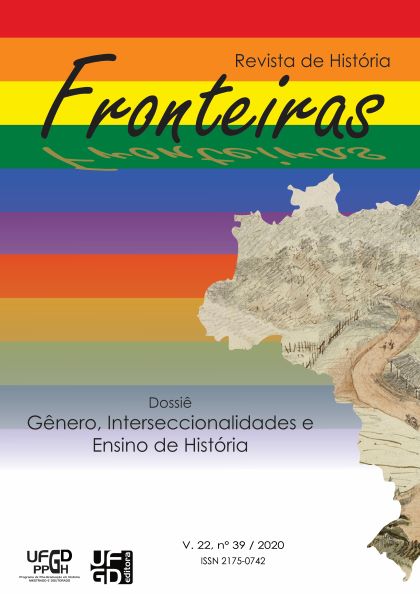A luta dos(as) Guarani e Kaiowá em Mato Grosso do Sul por Kunã Aranduhá
DOI:
https://doi.org/10.30612/frh.v22i39.12579Resumo
Jaqueline Gonçalves Porto, Kunã Aranduhá na língua guarani, é uma jovem liderança Guarani e Kaiowá. À importância de ser uma liderança feminina combatente em tempos tão sisudos e violentos para os povos tradicionais do Brasil, soma-se o fato de Aranduhá se constituir uma das protagonistas e organizadoras da Grande Assembléia de Mulheres Indígenas Guarani Kaiowá, a Kunangue Aty Guassu, que acontece anualmente nas terras indígenas em Mato Grosso do Sul, acolhendo mulheres indígenas de diferentes tekohas para a discussão de agendas específicas das mulheres. Essa entrevista foi realizada em setembro de 2019, nas dependências da Universidade Federal da Grande Dourados, onde Jaqueline é uma liderança também entre os(as) estudantes indígenas. Ela formou-se recentemente em Ciências Sociais e iniciou recentemente o mestrado em Antropologia Social, na mesma instituição. Sobre as suas vivências, sua experiência de militância indígena e sobre os feminismos é que conversamos, principalmente buscando refletir de que forma a atuação de uma jovem liderança indígena e feminista provoca (ou não) mudanças na produção do conhecimento, nas práticas educacionais e nas relações entre estudantes indígenas e não indígenas. Buscando trazer provocações a partir dos estudos indígenas e da epistemologia feminista, faz críticas à ciência colonial androcêntrica. Nossa conversa explicitou a força e a vibração dessa militante Guarani Kaiowá, feminista e mãe, que tem muito o que nos ensinar com sua força e perseverança, principalmente com a humildade e o respeito que tem com seu povo, sobretudo em relação às mulheres de diferentes gerações. What do you want to do ?New mailCopyDownloads
Não há dados estatísticos.
Publicado
2020-04-06
Como Citar
Nichnig, C. R., & Sampaio, P. F. (2020). A luta dos(as) Guarani e Kaiowá em Mato Grosso do Sul por Kunã Aranduhá. Fronteiras, 22(39), 212–224. https://doi.org/10.30612/frh.v22i39.12579
Edição
Seção
ENTREVISTA
Licença
Autores que publicam nesta revista concordam com os seguintes termos:
- Autoras e autores mantém os direitos autorais e concedem à revista o direito de primeira publicação, com o trabalho simultaneamente licenciado sob a Creative Commons Atribuição-NãoComercial-CompartilhaIgual 3.0 Brasil, permitindo o compartilhamento do trabalho com reconhecimento da autoria do trabalho e publicação inicial nesta revista.
- Autoras e autores têm autorização para assumir contratos adicionais separadamente, para distribuição não-exclusiva da versão do trabalho publicada nesta revista (ex.: publicar em repositório institucional ou como capítulo de livro), com reconhecimento de autoria e publicação inicial nesta revista.
- Autoras e autores têm permissão e são estimulados a publicar e distribuir seu trabalho online, como em repositórios institucionais ou em páginas pessoais, a qualquer ponto antes ou durante o processo editorial, já que isso pode gerar alterações produtivas, bem como aumentar o impacto e a citação do trabalho publicado (Veja O Efeito do Acesso Livre).


